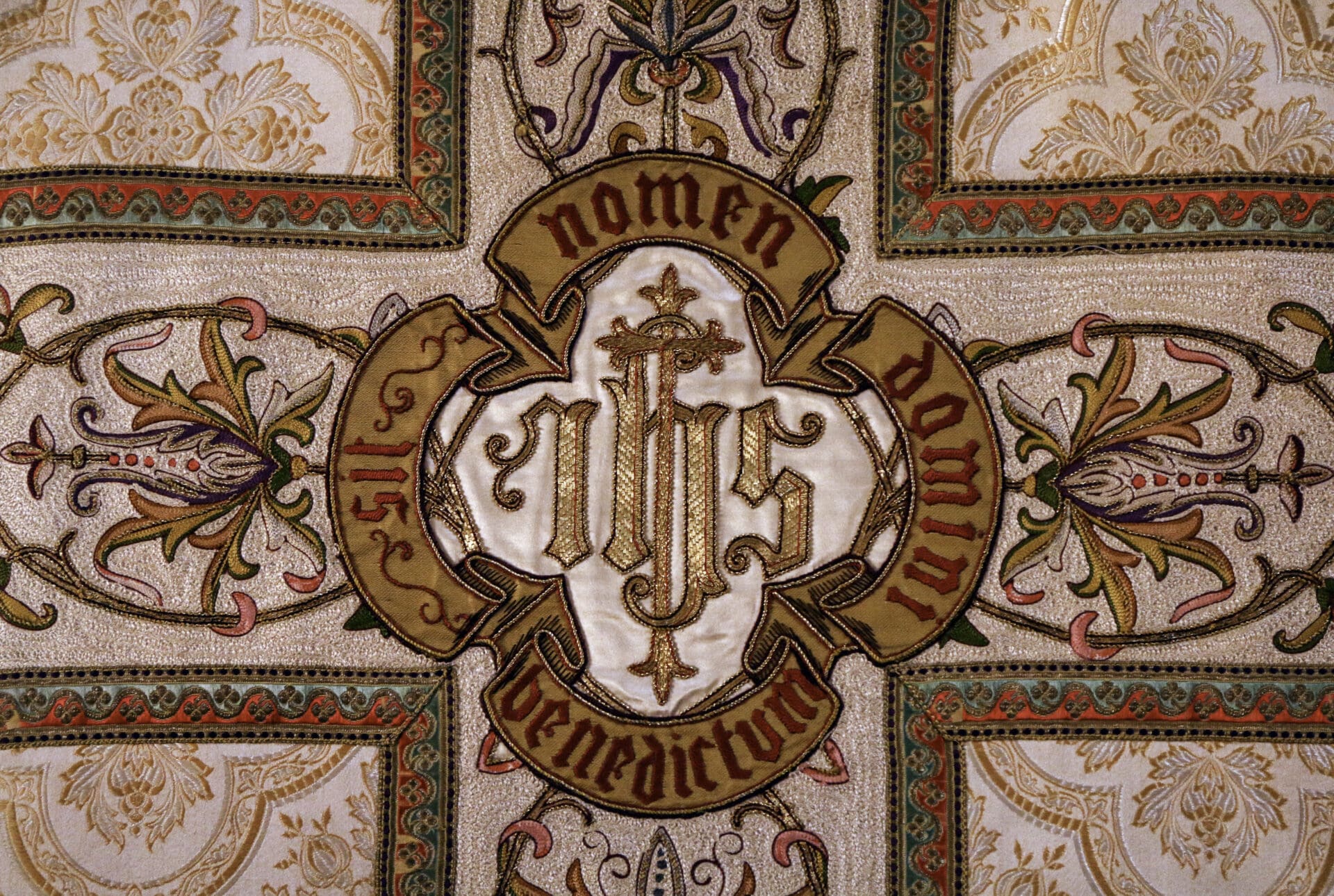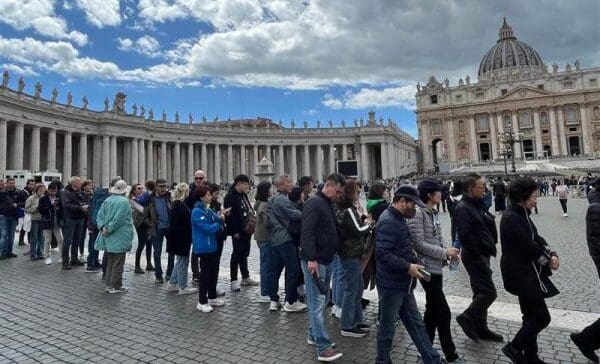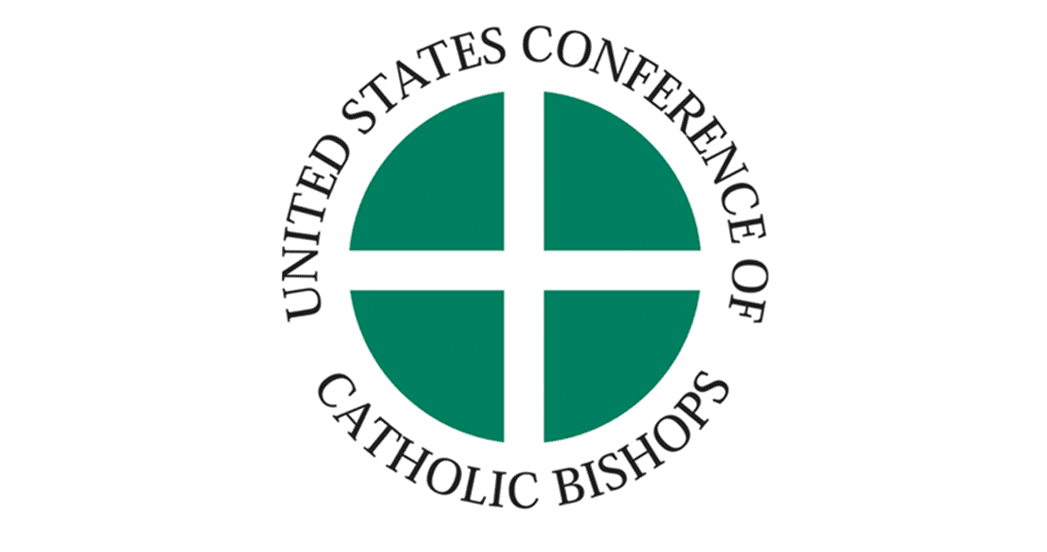Q: What are Mass stipends? Are these the same as Mass offerings?
A: As the 1912 Catholic Encyclopedia defines it, a Mass stipend is “a certain monetary offering which anyone makes to the priest with the accompanying obligation of celebrating a Mass in accordance with the intentions of the donor.” In common parlance, the terms “Mass stipend” and “Mass offering” are interchangeable. However, there is a difference between a true Mass stipend and a Mass “novena” or “prayer guild” or “Mass guild” (common among shrines and religious orders) which has one or more Masses said for all the intentions or guild members rather than a single Mass for each intention. In such cases, the offering is not a true Mass stipend or even a so-called “collective intention.”
Q: How do Mass stipends differ from “stole fees” or honoraria?
A: So-called “stole fees” are monetary offerings which someone makes to the parish on the occasion of the celebration of a sacrament or sacred rite—other than Mass. Such an offering does not come with an obligation as with a Mass stipend. According to canon law (canon 1264, 2º), the standard or suggested offerings for other sacraments and sacramentals are set by the bishops of an ecclesiastical province. For example, in the Milwaukee Province (which encompasses the five dioceses of Wisconsin), the suggested amounts are $10 at the time of baptism; $75 at the time of marriage; and $50 at the time of Christian burial. It is up to the diocesan bishop to determine where this donation goes: to the parish, to a fund for works of charity, to the priest or deacon, or to some other place. However, when an individual voluntarily offers more than the suggested offering, the priest or deacon must judge whether the intention of the donor is to give the amount beyond the suggested offering to the priest or deacon himself, or to the parish for the destination of the suggested offering.
An honorarium, in this context, is an offering given directly to the priest or deacon on the occasion of the celebration of a sacrament or sacred rite. It is distinct from the “stole fee” whose destination may differ. Unless specified differently by the donor, canon law requires donations given to the pastor or administrator of a parish to be given to the parish itself. The donor must be clear on the purpose of the donation: to the priest or deacon, or to the parish.
Q: What is the history of Mass stipends?
A: Like many matters in the Church, there are both practical and theological or spiritual elements to Mass stipends. Regarding the practical, the 1912 Catholic Encyclopedia comments that the justification for Mass stipends lies incontestably in the axiom of St. Paul: “Those who minister at the altar share in the sacrificial offerings” (1 Corinthians 9:13). Originally, the Mass stipend provided to the priest the necessaries of life: food or otherwise. Later, it became a sum of money, the object being to contribute to the proper support of the clergy. The Catholic Encyclopedia comments: “The now customary money offering, which was introduced about the eighth century and was tacitly approved by the Church, is to be regarded merely as the substitute or commutation of the earlier presentation of the necessaries of life.”
Current canon law remarks that the Christian faithful who give an offering to apply the Mass for their intention contribute to the good of the Church and by that offering share its concern to support its ministers and works (canon 946). Priests are supported by the Mass offerings they receive. In the United States and in much of the Western world, this is no longer strictly the case as priests receive a salary from their parish or diocese, or are provided for by their religious community. Nonetheless, Mass offerings still contribute to the proper support of the clergy and provide a way for the faithful to make a sacrifice of their resources for the good of the Church.
Regarding the theological or spiritual element, it is understood that the “fruits of the Mass” are temporal or spiritual benefits, pardon for sins, and pardon for the punishment due to sin. Dominican Father Francis McCadden remarks that “all the faithful, whether living or dead, participate in the fruits of all Masses in a general way. The person for whose intention the Mass is said receives these fruits in a more special manner than the faithful in common.” Therefore, when a priest accepts a Mass stipend, he enters into a quasi-contractual agreement with the donor to celebrate a Mass in order to apply the fruit of the Mass to the intention. Therefore, even when a priest agrees to celebrate a Mass for no stipend or in Western countries where a stipend no longer completely supports a priest financially, the spiritual benefits of the Mass still exist.
Q: How much should one give for a typical Mass stipend?
A: According to canon law (canon 952), it is for the provincial council or a meeting of the bishops of the ecclesiastical province to define by decree for the entire province the amount of the offering. A priest is not permitted to seek a larger amount, although he may accept a voluntary offering which is larger or smaller than the one defined. If no decree has been issued, the custom of the diocese is to be followed. Religious institutes follow the same decree or custom in the territory where they are located. In the United States, the range of offerings is between $5 and $20 per Mass, with $10 probably being the most common.
If someone offers the priest or parish a sum of money without any indication of the number of Masses to be celebrated, the number is to be determined based on the standard offering in place where the donor resides, unless the intention of the donor must be presumed legitimately to have been different. Therefore, if the standard offering is $10 and a priest receives $50 with no indication of the number of Masses, he is to celebrate five Masses. However, if the donor asks him to celebrate “one Mass” and offerings him $50, one Mass is sufficient.
Q: What if I cannot afford the amount asked for a Mass stipend?
A: A priest may accept an offering lower than the defined or customary amount, including no offering. Canon law recommends earnestly to priests that they celebrate Mass for the intention of the Christian faithful, especially the needy, even if they have not received an offering. According to canon law, the needy should not be deprived of the assistance of the sacraments because of poverty. However, canon law does not require a priest to accept an offering smaller than the one defined or is customary—this is since some priests, especially missionary ones, may rely solely on Mass offerings for their livelihood and cannot justifiably accept a smaller amount.
Q: Can a priest receive more than one Mass stipend for a single Mass?
A: While a priest may legitimately celebrate more than one Mass per day when the law or the local ordinary allows it and have a separate intention for each Mass, he may only accept one offering or stipend each day (except on Christmas). The others are to be forwarded to the purposes prescribed the bishop. These purposes vary from diocese to diocese and include seminarian funds, clergy retirement funds, or missionary activity.
Q: Can my single Mass stipend include many intentions (“Bill, Mary, and Grandma”)?
A: Mass intentions may be for a living or deceased person (although not for the blessed in heaven or, generally speaking, the damned souls in hell), a group of people (such as one’s parents or “the deceased members of the Smith family”), or for a special intention. Even if an intention has multiple people (e.g., “Bill, Mary, and Grandma”), it is considered a single intention when there is one donor. In fact, intentions such as “the living and deceased members of the Doe and Smith families” are considered a single intention, even though the number of persons is practically uncountable. At a concelebrated Mass, each priest may have a separate intention and may receive a stipend for the celebration, even though it is a concelebrated Mass (recalling, nevertheless, that a priest may retain only one stipend per day, except on Christmas).
Q: Can Mass intentions—and, therefore, Mass stipends—be combined?
A: The tradition and canonical norm is that each intention is to be fulfilled by the celebration of a Mass. However, due to various factors, the Apostolic See, since 1991, has permitted so-called “collective intentions” whereby various people combine their offerings in a single offering, satisfied in a single Mass. However, the norms regarding these collective intentions must be followed: the people making the offering must have been previously and explicitly informed and must have freely consented to combining their offerings; and it is necessary that the place and time for the celebration of this Mass, which is not to be said more than twice a week, be made public. The priest who says this Mass may only retain one stipend and the rest are forwarded to the purposes prescribed by the bishop. Collective intentions are an exception to the canonical norm. Nonetheless, in many places where, due to the lack of priests, Mass is not said daily, this can be a way for the faithful to have a Mass said for their loved ones.
Q: What is the “Mass for the people”—and does it involve a Mass stipend?
A: Latin canon law binds pastors of parishes (and also parochial administrators and priest moderators) to apply a Mass for the people entrusted to them on each Sunday and holyday of obligation observed in their diocese (canon 534). This Mass is known as the “Mass for the people” or Missa pro populo. In parish bulletins, it is sometimes written as “For the people of St. Agnes Parish,” or similar. If a pastor has the care of several parishes, he fulfills the requirement with one Mass. If the pastor is lawfully impeded in celebrating this Mass, he is to have another priest apply the Mass on the proper day or apply it himself on another day. While previously the Missa pro populo must have been celebrated in the parish church, this is no longer the case, nor is authorization from the ordinary (i.e., bishop) required to celebrate it on other days.
Diocesan bishops must also celebrate a Missa pro populo for the people entrusted to them on each Sunday and holyday of obligation observed in their diocese (canon 588). If a bishop oversees more than one diocese, even as an administrator, he fulfills the requirement with one Mass. Like pastors, if the bishop is lawfully impeded in celebrating this Mass, he is to have another priest apply the Mass on the proper day or apply it himself on another day.
The Missa pro populo is not to be combined with other intentions and the celebrant receives no stipend for this Mass, although most canonists agree that a stipend can be received for a second Mass on that day.
Q: How far in advance should a parish accept Mass stipends?
A: No one is permitted to accept more offerings for Masses than can be satisfied within a year. If a priest or parish receives more offerings than can be satisfied, it is permitted for them to be celebrated elsewhere, unless the donors have forbidden this. Such Masses are frequently given to missionary priests, retired priests, and priests without a parochial assignment (such as chaplains, students, or curial officials).
Q: What if the priest cannot fulfill each offering received for a Mass stipend?
A: Canon law requires every priest to note accurately the Masses which he has accepted and those which he has satisfied. Pastors are to see that a special register for this purpose is used in churches that accept offerings; the bishop or his delegate is to examine such a register annually.
If a priest or parish cannot fulfill each offering (e.g., due to an abundance or due to death), the Masses should be given to other priests to fulfill. If this is not possible, the diocesan bishop or the supreme moderator of a clerical institute of consecrated life or a society of apostolic life, for a just and necessary cause, can reduce the obligations of Masses. This ability was formerly reserved to the Apostolic See until Pope Francis changed canon law in February 2022. Nonetheless, individual priests, in the internal forum, can petition the Apostolic Penitentiary which has jurisdiction to sanate (retroactively correct), reduce, or make provision for such intentions.
—Answers by Father Alan Guanella
Diocese of La Crosse, WI


